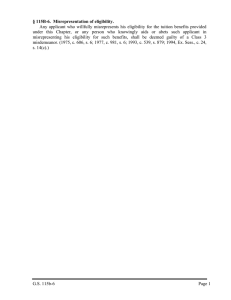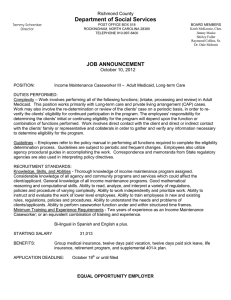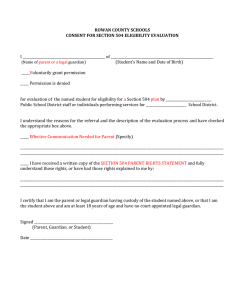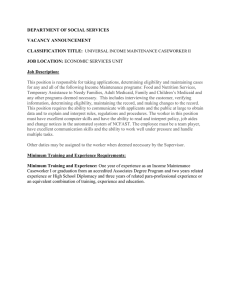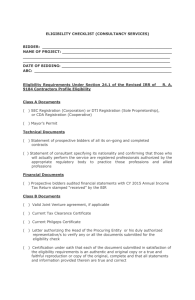DIVISION CIRCULAR #3 (N.J.A.C. 10:46) DEPARTMENT OF HUMAN SERVICES
advertisement
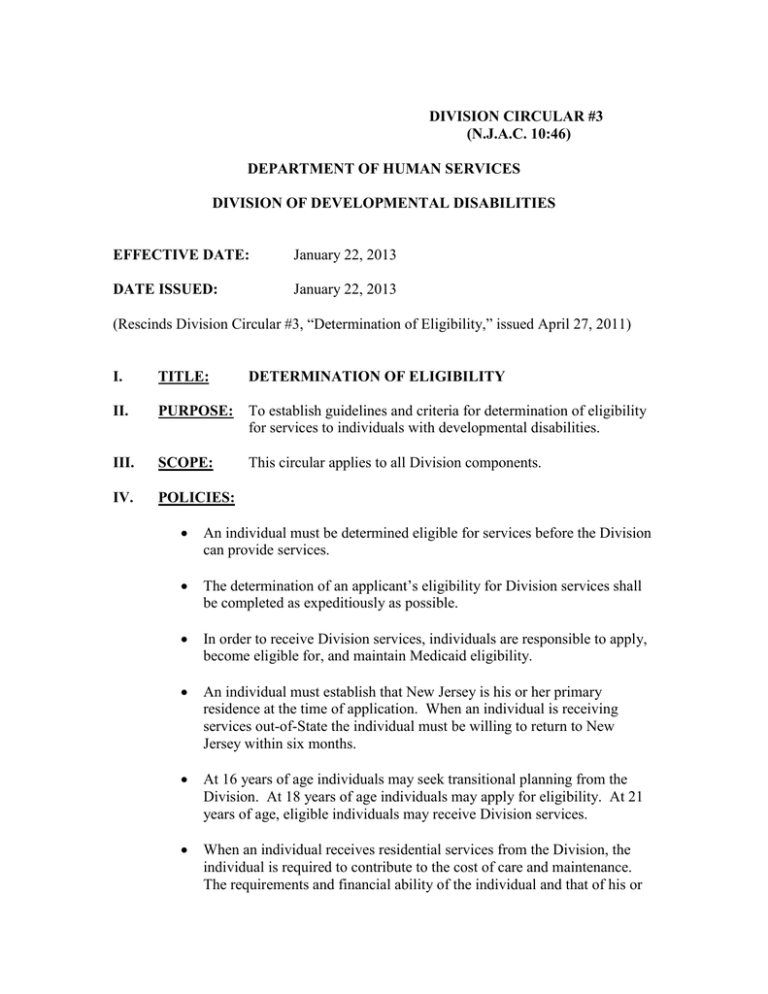
DIVISION CIRCULAR #3 (N.J.A.C. 10:46) DEPARTMENT OF HUMAN SERVICES DIVISION OF DEVELOPMENTAL DISABILITIES EFFECTIVE DATE: January 22, 2013 DATE ISSUED: January 22, 2013 (Rescinds Division Circular #3, “Determination of Eligibility,” issued April 27, 2011) I. TITLE: DETERMINATION OF ELIGIBILITY II. PURPOSE: To establish guidelines and criteria for determination of eligibility for services to individuals with developmental disabilities. III. SCOPE: This circular applies to all Division components. IV. POLICIES: An individual must be determined eligible for services before the Division can provide services. The determination of an applicant’s eligibility for Division services shall be completed as expeditiously as possible. In order to receive Division services, individuals are responsible to apply, become eligible for, and maintain Medicaid eligibility. An individual must establish that New Jersey is his or her primary residence at the time of application. When an individual is receiving services out-of-State the individual must be willing to return to New Jersey within six months. At 16 years of age individuals may seek transitional planning from the Division. At 18 years of age individuals may apply for eligibility. At 21 years of age, eligible individuals may receive Division services. When an individual receives residential services from the Division, the individual is required to contribute to the cost of care and maintenance. The requirements and financial ability of the individual and that of his or her legally responsible relative to contribute to the cost of care and maintenance are set forth in N.J.A.C. 10:46D, “Contributions for Care and Maintenance Requirements,” also known as Division Circular #3A. V. Individuals who have been determined ineligible for Division services may appeal the decision in accordance with the provisions of Division Circular #37, “Appeals Procedure” (N.J.A.C. 10:48 et seq.). GENERAL STANDARDS: NOTE: The remainder of this circular is the eligibility criteria as it appears at N.J.A.C. 10:46 et seq. ____________________________ Dawn Apgar, Ph.D, LSW, ACSW DA:DB.s 2 CHAPTER 46 DETERMINATION OF ELIGIBILITY SUBCHAPTER 1. GENERAL PROVISIONS 10:46-1.1 Purpose; authority (a) Pursuant to N.J.S.A. 30:1-12, 30:4-25.2, 30:4-25.9, 30:6D-1 et seq. (P.L. 1985, c. 145) and 30:4-60 et seq. (P.L. 1995, c. 155), the Division of Developmental Disabilities, Department of Human Services (Division), intends this chapter to establish guidelines and criteria for determination of eligibility for services to individuals with developmental disabilities. (b) Pursuant to N.J.S.A. 30:4-25.9, the applicant shall apply for and maintain all current and future benefits for which he or she may be eligible, including, but not limited to, Medicare, Medicaid, any other State or Federal benefits, and any thirdparty support pursuant to statute, rule, court order, or contract. The Division offers services funded through Medicaid and Medicaid waivers. In order for the Division to provide waiver services to an individual, the individual must be eligible for the waiver, the service provided must be a waiver service, and the setting in which the service is provided must meet waiver requirements. The individual, guardian, or representative-payee, as applicable, must apply for the appropriate waiver and comply with all the requirements of eligibility for these benefits. The individual, guardian, or representative-payee is also responsible for maintaining eligibility for those benefits. Medicaid eligibility is determined by and through the appropriate eligibility agency. (c) When an individual receives residential services from the Division, he or she is required to contribute to the cost of care and maintenance. The requirements and financial ability of the individual and that of his or her legally responsible relatives to contribute to the cost of care and maintenance are set forth in N.J.A.C. 10:46D, Contributions for Care and Maintenance Requirements. Pursuant to N.J.S.A. 30:4-25.9, the obligation to make payments is a condition of eligibility. (d) The availability of services shall be limited to the Division’s funding in a given fiscal year. (e) If an individual fails to obtain and maintain Medicaid eligibility as determined by the appropriate Medicaid eligibility agency, the individual remains responsible for the full cost of care and the Division reserves the right to charge the individual for any expense that the Division incurs while providing services without Federal assistance. 3 (f) To the extent practicable, Division applications, publications, and other written materials shall be provided in the individual’s primary language and in alternate formats as needed. 10:46-1.2 Scope The provisions of this chapter shall apply to all individuals applying to the Division for eligibility under N.J.S.A. 30:4-25.1 et seq. and 30:4-165.1 et seq. Individuals under the age of 21, individuals who do not meet functional eligibility criteria, and individuals who are not Medicaid eligible, are not eligible to receive Division services, except for transitional planning as provided for in N.J.A.C. 10:46-2.1(f). 10:46-1.3 Definitions The following words and terms, when used in this chapter, shall have the following meanings unless the context clearly indicates otherwise. “Application” means the form available at Division offices or on the Division website at: www.state.nj.us/humanservices/ddd/services/apply/application.html (see N.J.A.C. 10:463.2(a)). The term includes any supporting documentation deemed necessary by the Division to make an informed determination with regard to applicant eligibility, including medical information. Supporting documentation may include, but is not limited to, educational, psychiatric, psychological, vocational, rehabilitation, medical, and social service records. “Assistant Commissioner” means the Assistant Commissioner of the Division of Developmental Disabilities. "Benefits" means all current and future sources of cash and health assistance from Federal, State, or private entities including, but not limited to, Social Security, SSI, Medicare, Medicaid, State, and Federal funds and any third-party support pursuant to State rule, order, or by contract. “Commissioner” means the Commissioner of the New Jersey Department of Human Services. “Developmental disability” means a severe, chronic disability of an individual, which: 1. Is attributable to a mental or physical impairment or combination of mental or physical impairments; 2. Is manifest before age 22; 3. Is likely to continue indefinitely; 4 4. 5. Results in substantial functional limitations in three or more of the following areas of major activities of daily living: i. Self-care; ii. Receptive and expressive language; iii. Learning; iv. Mobility; v. Self-direction; vi. Capacity for independent living; and vii. Economic self-sufficiency; and Reflects the need for a combination and sequence of special interdisciplinary or generic care, treatment, or other services, which are of lifelong or extended duration and are individually planned and coordinated. Developmental disability includes, but is not limited to, severe disabilities attributable to intellectual disability, autism, cerebral palsy, epilepsy, spina bifida, and other neurological impairments where the above criteria are met. “Division” means the Division of Developmental Disabilities. “Guardian” means a person or agency who has qualified as a guardian of the person of an incapacitated individual pursuant to court appointment to make decisions on behalf of an incapacitated adult in those areas where incapacity has been determined by a court as set forth at N.J.S.A. 3B:12-24.1. “Intake team” means at least two professionals, one of whom is the intake worker and one who is a psychologist, who are responsible for determining whether the eligibility criteria contained in this chapter have been met. “Intake worker” means a professional employee of the Division or a contracted entity who completes an appropriate program of training as determined by the Division. The program of training, at a minimum, includes an orientation and instruction in the identification of developmental disabilities, the use of evaluation tools, and interaction techniques. “Intermediate Care Facility for Individuals with Intellectual or Developmental Disabilities (ICF/ID-DD)” means an institution (or distinct part thereof) for individuals with intellectual or developmental disabilities. 5 “Medical information” means reports that have been provided by licensed practitioners that demonstrate the existence of a developmental disability, as well as the individual’s current physical condition and significant medical history. “Mental illness” means a current substantial disturbance of thought, mood, perception, or orientation which significantly impairs judgment, behavior, or capacity to recognize reality but does not include simple alcohol intoxication, transitory reaction to drug ingestion, organic brain syndrome, or developmental disability. (P.L. 1987, c. 116.) “Mental impairment” means impairment in cognitive, neurological, sensory, or cerebral functioning resulting from other than mental illness. “Neurological Impairment (NI)” means a severe disorder of the central nervous system: 1. Evidenced by a medical diagnosis that is listed in the International Classification of Diseases, 9th revision, Clinical Modification (ICD-9CM), incorporated herein by reference, as amended and supplemented. The ICD-9-CM is available by contacting the Center for Disease Control and Prevention, National Center for Health Services, 3311 Toledo Road, Hyattsville, MD, 20782, or at www.cdc.gov; and 2. Documented by the results from valid medical or neuropsychological testing. “Personal care” means assistance in essential daily living activities, such as bathing, dressing, transferring, toileting, eating, grooming, and hygiene. “Physical impairment” means impairment in physical functioning that is substantial and results from neurological impairment, such as, but not limited to, cerebral palsy, spina bifida, spinal atrophies, and spinal cord injuries. “Primary residence” means the dwelling where the individual usually lives. Second homes or privately made residential placements are not a primary residence. “Resident” means a person who is a domiciliary of New Jersey for other than a temporary purpose and whose primary residence is in New Jersey. “Transitional planning” means information and training provided to individuals between the ages of 16 and 21 to prepare for the transition from an individual’s educational entitlement to adult life, with an emphasis on preparation for employment. “Waiver” means a Medicaid waiver authorized by the Federal Centers for Medicare and Medicaid Services (CMS), pursuant to a program in which states request permission from CMS to provide a broad array of services, excluding room and board, that are not otherwise covered under the Medicaid program. These services are designed to support 6 an individual in the individual’s home and community, thereby preserving the individual’s independence and bonds to family and friends, at a cost that is not higher than institutional care. “Waiver services” means the services available in the authorized Medicaid waiver program in which an individual is enrolled. SUBCHAPTER 2. ELIGIBILITY CRITERIA 10:46-2.1 General eligibility (a) An individual must be determined eligible for services under this chapter before the Division can provide services, not including transitional planning to individuals under the age of 21. (b) An individual must have a developmental disability in order to be determined eligible for services. (c) 1. Neurological impairment is not a diagnosis itself. Diagnoses related to neurological impairments that establish developmental disability may include, but are not limited to: spina bifida, epilepsy, traumatic brain injury, and acquired brain injury. 2. Conditions that do not independently meet the criteria set forth in the definition of developmental disability include, but are not limited to: i. An education classification of neurological impairment; ii. Attention deficit hyperactivity disorder (ADHD); iii. Learning disorder; iv. Oppositional defiant disorder; and v. Conduct disorder. An otherwise eligible individual who is not eligible for Medicaid shall receive time-limited services from the Division, not to exceed 30 days, when the following are met: 1. The services are necessary to address an immediate threat to life or safety; 2. The individual or his or her guardian complies with all requirements as determined by the Division, including, but not limited to, completing all necessary paperwork in an expedited manner and acknowledging, in 7 writing, that the services are time-limited and will be terminated within 30 days unless the individual becomes eligible for Medicaid within that timeframe; and 3. (d) The written authorization of the Assistant Commissioner has been obtained. An otherwise eligible individual receiving services from the Division, who was previously eligible for Medicaid and loses Medicaid eligibility, shall receive timelimited services not to exceed 60 days from the time of Medicaid ineligibility, provided that: 1. The individual or his or her guardian complies with all requirements as determined by the Division, including, but not limited to, completing all necessary paperwork in an expedited manner and acknowledging, in writing, that the services are time-limited for a period of 60 days unless the individual becomes eligible for Medicaid within that timeframe; and 2. The written authorization of the Assistant Commissioner has been obtained. (e) An individual receiving services under (d) above shall receive services for an additional time-limited period not to exceed 30 days, provided the conditions in (c)1, 2, and 3 above are met. (f) Individuals receiving services from the Division on January 22, 2013, who are not Medicaid eligible shall continue to receive services for a period not to exceed March 23, 2013. The individual shall receive services for an additional timelimited period not to exceed 30 days, provided the conditions in (c)1, 2, and 3 above are met. (g) In order to receive waiver services, an individual or his or her guardian is responsible to apply, and become eligible for, the applicable Medicaid waiver. Individuals are also responsible to apply for and maintain all current and future benefits for which the applicant may be eligible, including, but not limited to, any applicable waiver, Social Security, SSI, Medicare, Medicaid, any other State or Federal benefits and any third-party support pursuant to statute, rule, court order, or contract. The individual is also required to comply with all of the requirements of the programs for which she or he is eligible in order to maintain eligibility for services. (h) When an individual receives residential services from the Division, he or she is also required to contribute to the cost of care and maintenance. The requirements and financial ability of the individual and that of their legally responsible relatives to contribute to the cost of care and maintenance are set forth in N.J.A.C. 10:46D, Contributions for Care and Maintenance Requirements. 8 (i) At age 16, individuals may seek transitional planning from the Division. At age 18, individuals may apply for eligibility from the Division. The Division will not provide services to individuals, other than transitional planning, until the individual reaches 21 years of age. 1. Individuals who were determined eligible for services prior to January 22, 2013, shall be presumed eligible to receive Division services when they reach 21 years of age, except any individual born on or after January 1, 1997. Individuals born on or after January 1, 1997 shall be required to reapply to the Division for eligibility after they reach 18 years of age. (j) The Division may, in its discretion, reevaluate an individual’s eligibility at any time. A referral for reevaluation shall cite specific concerns regarding eligibility. (k) It is the Division’s policy to fund services in the State of New Jersey. 10:46-2.2 Residency (a) An individual must be a resident of New Jersey before the Division can provide services. It shall be the responsibility of the individual applying for eligibility, or his or her guardian, to establish residency in the State of New Jersey. Residency shall be determined in the following manner: 1. An individual applying for eligibility shall be deemed a resident of the State if he or she lives in the State as his or her primary residence at the time of application for eligibility, unless the individual meets the criteria outlined in (a)2 below. If an individual has a guardian, the guardian must also live in the State as his or her primary residence at the time of application for eligibility, unless the guardianship determination does not include residential decision-making by the guardian. 2. When an individual applying for eligibility is residing in an out-of-State residential placement at the time of application for eligibility, she or he shall indicate on the application that it is their intention to return to New Jersey to receive in-State services no later than six months after eligibility has been established. If the individual does not return to New Jersey within six months of the determination of eligibility, the individual will not have met the residency requirement, and eligibility will be rescinded. If the individual is not yet 21 years of age, the individual will have no more than six months after their 21st birthday to return to New Jersey or the individual will not have met the residency requirement and eligibility will be rescinded. 9 (b) (c) If an individual 21 years of age or older has already been determined functionally eligible for services and is residing in an out-of-State placement, the individual shall return to New Jersey within six months of notification from the Division or the individual will no longer meet the residency requirement and eligibility will be rescinded. An individual whose eligibility is rescinded under this section may reapply at any time if she or he returns to New Jersey and is living in the State as his or her primary residence. 1. If the individual’s out-of-State residential placement is being funded by the Division, the individual may choose to either return to his or her family home in New Jersey and receive in-home supports, or shall be offered an in-State residential placement. 2. If the individual’s out-of-State residential placement is not being funded by the Division, but the individual meets the emergency criteria listed in N.J.A.C. 10:46B, the individual shall be offered in-State emergency services. Exceptions to (a)2 and (b) above may be made with the authorization of the Assistant Commissioner in one of the following two circumstances only: 1. The Division has been unable to make an offer of placement within the six-month timeframe, and the individual and his or her guardian are fully cooperating and making substantial and documented good faith efforts to further the goal of locating in-State services. Substantial and documented good faith efforts include, but are not limited to: attending all transitional and planning meetings, participating in in-State program visits, completing all necessary waiver and other paperwork, and responding to all Division requests for information in a timely manner; or 2. The individual’s services are reimbursed by Medicaid under the Community Care Waiver (CCW) and health and safety can be assured despite the individual not residing in the State. (d) If an individual who has a guardian is admitted to services, and the guardian moves out-of-State, the individual may remain in Division services. Additionally, the guardian is free to request a discharge from services or an interstate transfer. (e) If any individual is receiving services funded totally or partially by a public or private agency in another state, that individual shall not be considered a resident of New Jersey. (f) For individuals applying for services whose guardian is in the U.S. military service, residency may be established when the guardian can produce permanent change of station orders to New Jersey. 10 (g) For individuals applying for services who are not U.S. citizens, the following must be satisfied to establish residency: 1. The individual must be a permanent alien resident, or his or her guardian must be a U.S. citizen or a permanent alien resident; 2. The individual or his or her guardian must be a resident of New Jersey; and 3. The individual must be New Jersey Medicaid eligible. SUBCHAPTER 3. APPLICATION 10:46-3.1 (a) Who May Apply Application for eligibility to receive Division services at the age of 21 under this chapter may be made by the following individuals: 1. An individual 18 years of age or older may apply on his or her own behalf; 2. The guardian of an individual 18 years of age or older; or 3. A court of competent jurisdiction may apply on behalf of an individual 18 years of age of older, who appears to have a developmental disability. (b) Pursuant to P.L. 2012, c. 16, sec. 158, the Division may continue to provide services to certain individuals under age 21 whom it is serving on January 22, 2013. (c) Eligibility for services from any other State agency, including but not limited to, the Department of Health, the Department of Children and Families, or a local education authority, does not create a presumption of eligibility for Division services. 10:46-3.2 How to apply (a) Application shall be made on forms supplied by the Division. (b) Documentation to substantiate a diagnosis of a developmental disability will be required. (c) Minimum information submitted shall include, but not be limited to: 1. Social data, such as name, address, date of birth, telephone number, Social Security number, and present living arrangement; 11 2. Medical information; 3. Present program or employment type; 4. Name, address, and telephone number of the contact person, if someone other than the person on whose behalf application is being made; 5. Presenting request, such as the specific services(s) that may be desired, if known by the individual; 6. Information for the individual’s financial information sheet including basic information, such as Social Security number and the amount and type of benefits received, and those documents as required under N.J.A.C. 10:46D, Contribution to Care and Maintenance Requirements; 7. Documentation of residency; and 8. Documentation establishing guardianship, if applicable. (d) Accommodations shall be made available by the Division for applicants who cannot complete the application by him- or herself. Applications may be taken at any site designated by the Division, which will facilitate the determination of eligibility. (e) It is the responsibility of the applicant to cooperate with the Division in obtaining required records by signing consent to release of information forms and identifying individuals or agencies known by the applicant to be in possession of the needed records. (f) An application shall be deemed complete when there is sufficient information to make a determination of eligibility. An applicant has one year from the date of the submission of the initial application to submit all supporting documentation to constitute a complete application or a new application will be required. Individuals who have started, but not completed, the full application process or have not yet been determined fully eligible for functional services as of January 22, 2013, will be subject to all requirements of this chapter. 10:46-3.3 Reapplication (a) An individual who has been found ineligible by the Division may apply for services again at any time if he or she has obtained a new evaluation(s), which supports that the eligibility criteria are met. 12 (b) The individual shall provide a copy of the evaluation(s) for review by the Division. The Division shall review the evaluation and notify the individual within 30 working days whether a new application for services will be accepted. (c) As used in this section, “evaluation” means a formal assessment using standardized measures by a professional, such as a physician, psychologist, or other individual who can appropriately evaluate the individual’s condition to determine whether the individual has a developmental disability. SUBCHAPTER 4. DETERMINATION PROCESS 10:46-4.1 Determination (a) An intake worker shall begin a case file upon receipt of an application for determination of eligibility for services. (b) The intake worker shall assist in completion of the application upon request of the applicant. (c) Upon receipt of an application, including all necessary documentation, the intake team shall make a decision, in writing, based upon specific findings regarding eligibility pursuant to N.J.A.C. 10:46-2. (d) The intake team may make a decision concerning eligibility. If there is a question of eligibility, the intake team may: (e) 1. Conduct a face-to-face interview within 30 days, if additional information is needed; or 2. Request peer consultation in reaching a final decision. The decision of the intake team(s) shall be communicated, in writing, within 10 working days and shall be based upon specific findings. 10:46-4.2 Notice requirements (a) Division staff shall notify the applicant, in writing, of the status of the eligibility determination no more than 60 days from receipt of a complete application for determination of eligibility for services. (b) If the eligibility decision cannot be made within 60 days from receipt of a complete application for determination of eligibility for services, the applicant shall be advised, in writing, as to the specific reasons why a determination cannot be made, and shall be informed of the status of the application at least every 30 days. The written notice shall include the name and telephone number of a Division staff member for the person to contact regarding services. 13 (c) (d) If the applicant is determined eligible, Division staff shall notify the applicant, in writing, within 10 working days of the determination and such notice shall include information regarding the service(s) deemed most suitable by the intake worker or the intake team. 1. If the most appropriate service as determined by the intake worker or the intake team is not immediately available, the Division shall provide an alternate service. 2. The Division may also place the eligible individual’s name on the Community Care Waiver Waiting List in accordance with N.J.A.C. 10:46C and/or any other applicable waiting lists. Nothing in this paragraph entitles an individual determined eligible for services to immediate enrollment on the Community Care Waiver or any other service for which there may be a waiting list. If the individual is determined ineligible, the Division shall notify the individual, in writing, within 10 working days of the determination. SUBCHAPTER 5 APPEALS PROCESS 10:46-5.1 Appeals (a) If the individual is determined by the Division not to meet the criteria for eligibility, the Division shall notify the individual in writing within 10 working days of the determination. 1. The notice shall include specific criteria that were not met by the individual. 2. The notice shall include information regarding the individual’s right to appeal the determination of ineligibility pursuant to N.J.A.C. 10:48. Such appeals shall be deemed to be contested matters. 3. The individual shall bear the burden of proof and the burden of persuasion. 14
